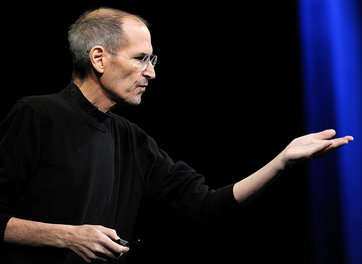
“Steve Jobs, a founder of Apple, has focused on his work to improve the lives of millions of people through technology.” Source of caption and photo: online version of the NYT article quoted and cited below.
The column quoted below, written before Steve Jobs’ death, asks an important question: should an innovative entrepreneur be a prominent philanthropist? I believe that innovative entrepreneurs can often do the most good by using their wealth to innovate rather than to donate.
(p. B1) Steve Jobs is a genius. He is an innovator. A visionary. He is perhaps the most beloved billionaire in the world.
Surprisingly, there is one thing that Mr. Jobs is not, at least not yet: a prominent philanthropist.
Despite accumulating an estimated $8.3 billion fortune through his holdings in Apple and a 7.4 percent stake in Disney (through the sale of Pixar), there is no public record of Mr. Jobs giving money to charity. He is not a member of the Giving Pledge, the organization founded by Warren E. Buffett and Bill Gates to persuade the nation’s wealthiest families to pledge to give away at least half their fortunes. (He declined to participate, according to people briefed on the matter.) Nor is there a hospital wing or an academic building with his name on it.
None of this is meant to judge Mr. Jobs. I have long been a huge admirer of Mr. Jobs and consider him the da Vinci of our time.
. . .
(p. B4) . . . Mr. Jobs has always been upfront about where he has chosen to focus. In an interview with The Wall Street Journal in 1993 , he said, “Going to bed at night saying we’ve done something wonderful … that’s what matters to me.”
For the full commentary, see:
ANDREW ROSS SORKIN. “DEALBOOK COLUMN; The Mystery of Steve Jobs’s Public Giving.” The New York Times (Tues., AUGUST 30, 2011): B1 & B4.
(Note: ellipsis between paragraphs added; ellipsis within last paragraph, in original.)
(Note: the online version of the commentary has the date AUGUST 29, 2011.)
